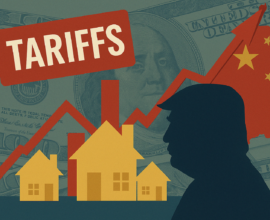2018 Tax Bill Impacts South Florida Real Estate Markets
In 2018 the most wide ranging tax reform bill has become law, also known as the 2018 Tax Bill. Does it promise to improve the real estate market in South Florida? Let’s look at the impact of different provisions of the new tax law.
The enactment of tax reform legislation will have far-reaching consequences and create new planning parameters for the real estate industry-particularly REITs and other investors in real estate.
The revised cap of only $10,000 on property tax deductions generally relates to single family homes of higher value. This means that homeowners will only be allowed a maximum deduction of $10,000, unlike in the past, where they could deduct the amount in full.
This will have a major negative impact home owners in high property tax states including New York, New Jersey, Massachusetts, Illinois, Pennsylvania and Connecticut by reducing the amount of disposable income these homeowner have and increasing the cost of home ownership. This should lower home values in these states and could impact the purchase of homes in Florida, as retirees or people thinking of relocating will have less available funds to purchase homes in Florida and the purchase of a new home will have less attractive tax benefit, especially homes costing greater than $750,000.
Additionally the new tax laws may drive down the value of homes in high tax states, also reducing the amount of funding people have to purchase a primary or secondary residence in Florida. This trend will impact the value of homes in Florida and may lower Florida real estate prices.
This is definitely not good news for homeowners residing in high-tax states like New York, California and New Jersey, or anyone with a heavy property tax burden.
Countering the trend created by the new limits on tax deductions is the law may increase the ongoing movement of people from the high income tax states to Florida, which generally has lower property taxes and no state income tax making it a more desirable place to live.
The new tax law creates changes to mortgage interest deductions, which permitted homeowners to deduct the interest on their mortgage loans on their first and second homes.
The deduction stays at $1 million for first homes purchased before December 15, 2017, but the mortgage deduction amount was lowered to $750,000. This means investors and homeowners will lose this important tax break and make the purchase of high value homes more expensive. Unfortunately, this impact is also going to make it more difficult for home owners in the high end markets to sell their homes. Sellers need to be cognizant as buyers may have less funding to purchase home requiring mortgages over $750,000.
As we have seen with other provisions of the new tax law the loss of the mortgage deduction for mortgages greater then $750,000 will reduce the disposable income of Floridians and potential Floridians, relocating from high tax states to purchase new homes.
Home equity loan interest will no longer be tax deductible, unless they are spent on making actual home improvements. In the past, homeowners were allowed interest deductions of up to $100,000 on their home equity loans regardless of how the funds from such loans were used. This meant that homeowners could use the funds for expenses that were not related to home improvement, like buying a car, paying for a child’s tuition or funding any other purchases outside their homes.
However, the new tax bill has closed this loophole by eliminating interest deductions for home equity loans spent outside the home. This means that you will have to spend your home equity loan on home improvement in order to qualify for interest deductions. This aspect of the new tax regulation should not affect Florida real estate values.
Moving Expenses is another category that was impacted by the new tax law. The new tax laws have removed moving expenses as a deduction. Prior regulations permitted homeowners to deduct moving expenses in reasonable amounts if they qualified according to certain criteria. This is not available now, but should not significantly impact the Florida real estate market.
As already mentioned, the 2018 Tax Bill reforms will affect buyers and sellers in a myriad of ways. Some will benefit, while others will be worse off. The real estate market will certainly be impacted by these new regulations. Some experts are forecasting a decline in home sales that will be caused by the new cap on mortgage interest deductions, especially of homes requiring mortgages greater then $750,000.
Real estate in more expensive priced areas is most likely going to be impacted by the tax regulations. The decline in mortgage interest deductions paired with the $10,000 deductible property tax limit is certain to discourage sales. Property prices may also be hurt due to the higher cost of homeownership in high-end markets. The new requirements may cause new home buyers to have to invest more cash in expensive areas particularly cities and coastal regions, reducing either the number of high priced home purchased or forcing buyers to purchase lower priced homes.
Currently interest rates are rising, so the impact of the new tax laws cannot be determined without considering other factors affecting the south Florida real estate marketing. The new tax laws will impact real estate sales and are going to provide changes throughout the industry this year. In fact, every property owner will experience changes on their final tax bill.
The major question to be answered is whether the attractiveness of south Florida real estate, (low property taxes coupled with no state income tax), will cause real estate prices to avoid any negative impact caused by reduced real estate prices and incomes in high tax states. How the 2018 Tax Bill will affect our markets is soon to be revealed.







